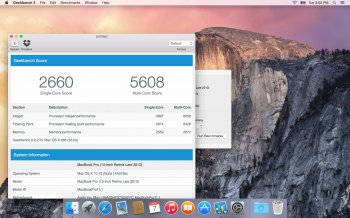File Details |
|
| File Size | 249.0 MB |
|---|---|
| License | Shareware, $14.99 |
| Operating System | Windows 7/8/10 |
| Date Added | February 15, 2023 |
| Total Downloads | 366 |
| Publisher | Primate Labs Inc. |
| Homepage | Geekbench |
Publisher's Description
Geekbench is a cross-platform processor benchmark with a new scoring system that separates single-core and multi-core performance, and new workloads that simulate real-world scenarios. It features new tests designed to simulate real-world scenarios. This helps make Geekbench an invaluable tool to determine how your current computer (or your next computer) will handle your tasks and applications. It includes stress tests, which are tests that help determine the stability of your system. Stress tests help you find small problems with your system before they become big problems.
Latest Reviews
CyberDoc999 reviewed v4.0.0 on Aug 31, 2016
Version 4 fixed much of this
it also has a Benchmark for your Video Card
Artem S. Tashkinov reviewed v3.3.2 on Mar 18, 2015
This benchmark is useless and worthless at the same time. Most its benches fit in the CPU cache, thus it has zero relevance in regard to heavy real world applications (web browsers, spreadsheets, authoring, video encoding, rendering, etc.)
It also disproportionally favors AES/SHA acceleration while there are very few such real world applications - so for most people these results don't mean anything at all.
In short Geekbench results can be safely neglected and dismissed as they don't represent anything worldly.
--------------------------------------------------------
Here's what Linus Torvalds says himself:
Wilco, geekbench has apparently replaced dhrystone as your favourite useless benchmark.
Geekbench is SH*T.
It actually seems to have gotten worse with version 3, which you should be aware of. On ARM64, that SHA1 performance is hardware-assisted. I don't know if SHA2 is too, but Aarch64 does apparently do SHA256 in the crypto unit, so it might be fully or partially so.
And on both ARM and x86, the AES numbers are similarly just about the crypto unit.
So basically a quarter to a third of the "integer" workloads are just utter BS. They are not comparable across architectures due to the crypto units, and even within one architecture the numbers just don't mean much of anything.
And quite frankly, it's not even just the crypto ones. Looking at the other GB3 "benchmarks", they are mainly small kernels: not really much different from dhrystone. I suspect most of them have a code footprint that basically fits in a L1I cache.
CyberDoc999 reviewed v4.0.0 on Aug 31, 2016
Version 4 fixed much of this
it also has a Benchmark for your Video Card
Artem S. Tashkinov reviewed v3.3.2 on Mar 18, 2015
This benchmark is useless and worthless at the same time. Most its benches fit in the CPU cache, thus it has zero relevance in regard to heavy real world applications (web browsers, spreadsheets, authoring, video encoding, rendering, etc.)
It also disproportionally favors AES/SHA acceleration while there are very few such real world applications - so for most people these results don't mean anything at all.
In short Geekbench results can be safely neglected and dismissed as they don't represent anything worldly.
--------------------------------------------------------
Here's what Linus Torvalds says himself:
Wilco, geekbench has apparently replaced dhrystone as your favourite useless benchmark.
Geekbench is SH*T.
It actually seems to have gotten worse with version 3, which you should be aware of. On ARM64, that SHA1 performance is hardware-assisted. I don't know if SHA2 is too, but Aarch64 does apparently do SHA256 in the crypto unit, so it might be fully or partially so.
And on both ARM and x86, the AES numbers are similarly just about the crypto unit.
So basically a quarter to a third of the "integer" workloads are just utter BS. They are not comparable across architectures due to the crypto units, and even within one architecture the numbers just don't mean much of anything.
And quite frankly, it's not even just the crypto ones. Looking at the other GB3 "benchmarks", they are mainly small kernels: not really much different from dhrystone. I suspect most of them have a code footprint that basically fits in a L1I cache.
